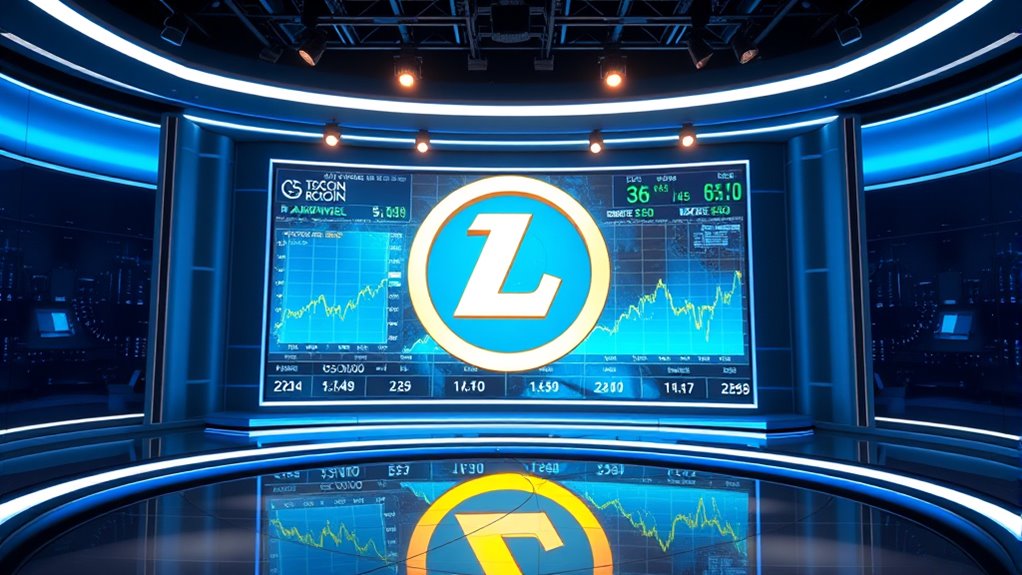The SEC’s approval of the first spot Litecoin ETF marks a major milestone, expanding your investment options in digital assets. This regulatory move boosts Litecoin’s legitimacy in regulated markets and attracts institutional interest. You gain easier, secure access to Litecoin through transparent ETFs, which reduce costs and risks. With custodians like Coinbase and BitGo ensuring safety, more investors can participate. Stay tuned to learn how this breakthrough shapes the future of crypto investing and broadens your opportunities.
Key Takeaways
- The SEC has approved its first spot Litecoin ETF, marking a significant milestone for digital asset regulation.
- The approval broadens investment options for investors seeking direct exposure to Litecoin via regulated funds.
- Custodians like Coinbase and BitGo ensure secure storage and compliance for the ETF’s underlying assets.
- This development signals increased institutional interest and market acceptance of Litecoin and crypto ETFs.
- Regulatory updates enable streamlined approval processes, encouraging more firms to launch crypto-based ETFs.
Significance of SEC’s Approval for Litecoin

The SEC’s approval of the first spot Litecoin ETF marks a pivotal milestone for the cryptocurrency market. It signals a shift toward broader acceptance of digital assets beyond Bitcoin and Ethereum, opening doors for institutional and retail investors. This approval validates Litecoin as a legitimate investment asset within regulated financial markets, fostering increased confidence. It also demonstrates the SEC’s evolving stance, recognizing the maturity of crypto markets and the importance of investor protection. By approving a regulated ETF, the SEC helps reduce barriers to entry, making Litecoin more accessible without the need for direct custody on unregulated exchanges. Overall, this move enhances liquidity, stability, and legitimacy for Litecoin, positioning it as a mainstream digital asset. Additionally, the move aligns with ongoing discussions about AI security and regulatory frameworks to ensure safe adoption of innovative financial products.
Details and Custodianship of the Litecoin ETF

The Litecoin ETF’s custodial setup involves trusted partners like Coinbase Custody Trust Company and BitGo Trust Company, ensuring your holdings are securely stored. These custodians handle safekeeping and operational security, giving you confidence in the ETF’s integrity. Additionally, the ETF charges a 0.95% annual management fee, balancing cost with robust security measures. For added assurance, the custodians employ vetted security protocols to protect digital assets against potential threats.
Custodial Partners’ Roles
Custodial partners play a crucial role in guaranteeing the security and integrity of the Litecoin ETF by safeguarding its underlying assets. You rely on trusted custodians like Coinbase Custody Trust Company and BitGo Trust Company to hold the Litecoin reserves securely. These custodians implement advanced security measures, including multi-signature wallets, cold storage, and strict access controls, to protect assets from theft and hacking. Their robust systems ensure that the Litecoin held for the ETF matches the fund’s holdings precisely, maintaining transparency and accountability. Additionally, custodians provide regular audits and reporting, giving you confidence that the assets are properly managed. Their use of secure storage methods is vital in preventing unauthorized access and ensuring the safekeeping of digital assets. This custodial framework is essential for maintaining investor trust and complying with regulatory standards, ensuring the ETF operates smoothly and securely.
Fee and Security Measures
To guarantee the security and efficiency of your Litecoin ETF investment, stringent measures are in place for managing fees and safeguarding assets. The ETF charges a 0.95% annual management fee, ensuring transparency and competitiveness. Custody is handled by Coinbase Custody Trust Company and BitGo Trust Company, both known for robust security protocols and regulatory compliance. These custodians securely store Litecoin reserves, reducing the risk of theft or loss. Administrative tasks, such as fund transfers, are managed by U.S. Bancorp Fund Services, LLC, while U.S. Bank, N.A., oversees cash custodianship, adding an extra layer of security. These arrangements ensure your assets are protected through trusted third-party custodians and clear fee structures, aligning investor interests with operational integrity. Additionally, employing security protocols helps prevent unauthorized access and potential breaches.
Market Response and Price Movements

Following the SEC’s approval of the spot Litecoin ETF, market reactions have been swift and pronounced. You’ll notice Litecoin’s price jumped roughly 16% early October, reflecting investor optimism. This surge was driven by heightened expectations of institutional participation and regulatory clarity. You might also see increased trading volumes as traders and retail investors position themselves ahead of broader adoption. Key market movements include:
- Rapid price appreciation of Litecoin post-approval
- Surge in trading volume and liquidity
- Growing institutional interest, including large LTC acquisitions
- Momentum shift toward Litecoin as a mainstream digital asset
- The recent approval demonstrates the influence of regulatory decisions on market dynamics
These movements signal heightened confidence and a reassessment of Litecoin’s value proposition. The approval acts as a catalyst, boosting both short-term trading activity and long-term investor optimism.
Regulatory Framework and Changes Facilitating Crypto ETFs

Recent regulatory changes, like the streamlined review process, make it quicker and easier to get crypto ETFs approved. The new in-kind redemption rules allow authorized participants to exchange assets directly, reducing costs and increasing efficiency. These updates create a clearer path for innovative products and boost confidence in the evolving crypto ETF market. Additionally, these regulatory enhancements help mitigate some of the compliance risks associated with new financial instruments.
Streamlined Review Processes
The SEC has implemented a streamlined review process for crypto ETFs that substantially accelerates approval timelines. This change allows you to see faster decisions on ETF applications, reducing the previous lengthy wait times. The process now features a single 75-day review window, making it easier for issuers to plan and respond. It also aligns crypto ETF reviews with traditional commodity-based ETFs, increasing consistency. Key benefits include:
- Faster evaluation of applications
- Clearer timelines for decision-making
- Enhanced consistency with existing ETF frameworks
- Reduced uncertainty for issuers and investors
- Ethical Hacking techniques are sometimes employed to test the robustness of the review process itself.
These updates encourage more fintech firms and fund managers to submit proposals, fostering innovation. Overall, this process makes it more efficient to bring new crypto ETFs to market, boosting investor confidence and market growth.
In-Kind Redemption Rules
In-kind redemption rules have become a key regulatory change that streamlines how crypto ETFs operate, allowing authorized participants to exchange underlying assets directly for ETF shares. This process reduces costs and improves liquidity by avoiding cash transactions. It also aligns crypto ETFs with traditional commodity-based ETFs, making operations more efficient. The rules enable participants to redeem the actual crypto assets, such as Litecoin, directly from the fund’s reserves. This minimizes market impact and price volatility during redemptions. Additionally, these changes promote active listening and understanding among investors by providing clearer pathways for transaction processes.
Industry Developments and Competitor Initiatives

As regulatory progress accelerates, industry players are actively pursuing new initiatives to capitalize on the growing demand for crypto ETFs. You’ll see firms like Grayscale filing applications for spot Litecoin ETFs, taking advantage of the SEC’s updated review framework. Nasdaq has also completed filings, signaling readiness for institutional trading. However, delays caused by the government shutdown temporarily paused final approvals. Industry analysts view this momentum as a breakthrough for altcoin ETFs, driven by increasing institutional interest. You can expect these developments to foster greater liquidity and mainstream acceptance. Key points include:
Regulatory progress boosts crypto ETF filings and institutional interest, driving liquidity and mainstream acceptance.
- Grayscale’s filings leverage the SEC’s streamlined review process
- Nasdaq prepares multiple crypto ETF listings
- Regulatory updates enable in-kind creations and redemptions
- Growing demand from institutions fuels new product launches
- Alimony laws and legal guidelines are evolving to adapt to new financial instruments and investor protections.
These initiatives reshape the competitive landscape and expand crypto investment options.
Advantages for Investors and Institutional Adoption

Regulated spot Litecoin ETFs provide investors and institutions with a straightforward way to gain exposure to Litecoin without the complexities of direct custody or trading on unregulated platforms. You benefit from transparent pricing, secure third-party custody, and familiar ETF structures that reduce counterparty risks. This setup makes Litecoin accessible to a broader range of investors, including those hesitant to manage digital wallets or navigate unregulated exchanges. The ETF’s in-kind creation and redemption processes lower costs and improve operational efficiency, benefiting both investors and issuers. Institutions can diversify their portfolios with Litecoin as they would with traditional assets, enhancing liquidity and stability. Additionally, these ETFs often incorporate features that support asset security, further protecting investor interests. Ultimately, these ETFs simplify entry into the crypto market, attracting more institutional participation and fostering mainstream adoption of Litecoin.
Frequently Asked Questions
How Does the Management Fee Compare to Other Crypto ETFS?
You’ll find that the management fee for this Litecoin ETF is 0.95%, which is in line with or slightly higher than many other crypto ETFs. Many crypto ETFs tend to have management fees ranging from around 0.50% to 1.00%, depending on the provider and underlying assets. So, this fee is competitive, especially considering Litecoin’s recent market momentum and the added security of regulated custody and operational efficiencies.
What Are the Specific Risks Associated With Litecoin Spot ETFS?
You should be aware that Litecoin spot ETFs carry risks like market volatility, which can lead to sudden price swings. There’s also the risk of custody issues if the assets aren’t properly secured, potentially resulting in loss or theft. Regulatory changes could impact your investment, and liquidity might be limited during market stress, making it harder to buy or sell large amounts without affecting the price. Additionally, technological vulnerabilities pose a threat to the underlying assets.
Will the ETF Trading Volume Reflect Actual Litecoin Market Activity?
Yes, the ETF trading volume is likely to mirror actual Litecoin market activity because the ETF’s in-kind creation and redemption process directly involves Litecoin. This means that increased trading in the ETF will reflect real buying and selling of Litecoin, enhancing price transparency. However, some volume may come from speculators or arbitrage traders, so it’s essential to monitor broader market trends to understand the true level of Litecoin activity.
How Secure Are the Custody Arrangements for Litecoin Reserves?
You can rest assured about the security of Litecoin reserves because they’re stored with Coinbase Custody Trust Company and BitGo Trust Company, both highly reputable. Imagine your Litecoin safely nestled in digital vaults guarded by layers of security, like a fortress with multiple locks. These custodians use advanced security measures, regular audits, and strict compliance standards, ensuring your assets stay protected from theft or loss, giving you peace of mind with your investment.
What Are the Tax Implications for Retail Investors in the ETF?
You’ll need to pay taxes on any gains you make from your ETF investments, including Litecoin. When you sell shares at a profit, you’ll owe capital gains tax, either short-term or long-term depending on how long you hold them. Dividends or distributions are taxed as income. Keep detailed records of your transactions, and consider consulting a tax professional to understand how these rules apply to your specific situation.
Conclusion
This SEC approval opens the door to a new chapter in crypto investing, like turning a key that unlocks a vault of opportunities. It signals that mainstream finance is finally embracing digital assets, making the landscape more navigable for you. As the market reacts and prices ripple, remember this moment as a spark igniting broader acceptance. Now, you’re standing at the frontier of a financial revolution, ready to seize the future that’s suddenly within reach.









